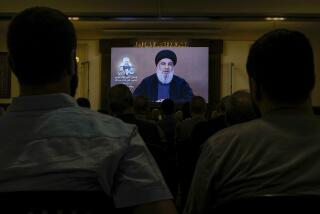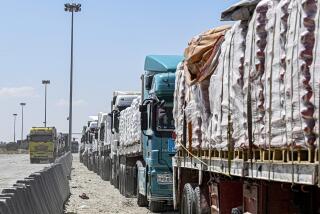The Beauty That Is Kashmir Turns Ugly Once Again as Tension Rises : Border conflict: India and Pakistan are at dagger points once again over a growing separatist movement. Some officials rate chances of another war at 50-50.
- Share via
NEW DELHI — A sharpening war of words between India and Pakistan over a separatist Muslim rebellion in strategic Kashmir could soon turn to armed conflict between the two countries, Western diplomats here say.
The diplomats said relations between New Delhi and Islamabad appear to be more tense than at any time since their last war, in 1971. Several officials estimated the chances of a new border war over India’s long-disputed northernmost state are now 50-50.
At issue is Pakistan’s support for the growing Kashmir separatist movement. Led by militant Muslims, thousands of demonstrators have demanded secession from mostly Hindu India to create an independent nation or to join neighboring Islamic Pakistan.
Heavily armed Indian troops have flooded the state, and scores of residents have died in almost daily street violence.
“The situation is very grave,” one Western diplomat said. “There is widespread apprehension that war is increasingly possible,”
“It’s much more tense,” another diplomat agreed. “And both sides expect it to get worse.”
“It is a tinderbox,” a third foreign official declared. “There’s a real threat of war.”
Famed for its rugged beauty, Jammu and Kashmir, as the region is officially called, has been in dispute since India and Pakistan gained independence in 1947. Two of the three wars between them--in 1948 and 1965--focused on Kashmir. The first round of fighting was ended by a U.N. cease-fire in 1949, and the area was divided by a line of control snaking across the mostly mountainous region. An estimated 200,000 Indian and Pakistani troops and paramilitary forces guard the line, occasionally exchanging fire.
India has integrated its part of the region into India as the state of Jammu and Kashmir, the only Indian state where Muslims are a majority, despite protests by Pakistan and calls for a plebiscite. The northern part of the region remains under the control of Pakistan.
A curfew imposed several days ago to curb Kashmiri militants was relaxed for 12 hours Thursday in Srinagar, the capital, Indian radio said. It said no violence was reported. Independent confirmation of the situation was difficult because India forced most journalists for foreign news media to leave Jammu and Kashmir last weekend. The Associated Press reported Thursday that its reporter in Srinagar and the reporter for the French news agency Agence France-Presse, both Indian citizens, also had been ordered to leave.
Last week, anti-Indian crowds were reported almost daily in snowbound Srinagar and several smaller towns. Visitors said mosques urged public defiance of the Indian troops.
On Tuesday, Pakistan’s foreign minister, Sahabzada Yaqub Khan, charged in an emotional 10-minute television and radio address that Indian troops had committed “atrocities” by killing “hundreds” and arresting “thousands” in Kashmir. Other Pakistani politicians called for an Islamic holy war against India.
An Indian government spokesman, in turn, angrily accused Pakistan of inciting “subversion, violence and terrorist activities” and blatantly interfering in India’s affairs.
The Indian army chief pointedly warned that any Pakistani attack would meet a “hot reception.” And the president of the Janata Party, part of the ruling government coalition, warned that war was “now inevitable.”
Both countries have launched diplomatic offensives, meeting U.S., European, Soviet and Arab officials to garner support. Indian Foreign Secretary S.K. Singh was reported en route to Washington on Thursday to brief the Bush Administration.
In New Delhi, 550 miles south of Srinagar, the diplomatic dispute and threat of war dominate front pages and dinner tables. Even those who oppose another war insist that India will never let Jammu and Kashmir secede.
“This is one of the touchstones of Indian nationalism,” said Bharat Wariavwalla, senior fellow at the Center for the Study of Developing Societies. “We’ve fought two wars over Kashmir. No Indian government could give it up. No government will allow it to secede. And Pakistan knows that.”
He and other analysts fear that an accidental border shooting, or other unplanned provocation, could trigger a war in the highly charged atmosphere. They warn that Pakistan’s Prime Minister Benazir Bhutto and India’s new prime minister, Vishwanath Pratap Singh, both face considerable political pressure on the issue.
“The situation is explosive enough to engulf the entire subcontinent,” warned M.L. Kotru, resident editor of the Statesman newspaper.
Bhutto has called an unusual all-party meeting for Sunday in Islamabad to discuss Kashmir and decide whether to take the issue to the United Nations. India insists that Kashmir is an internal issue and would object strongly to such a move, officials here said.
A senior Pakistani diplomat said in an interview here that the two countries have agreed to keep normal diplomatic channels open for now.
“We know what conflict and war means,” he said. “We are not trigger-happy people.”
The situation could “snowball out of control,” he said, but both countries recognize the dangers.
“We are both wiser now,” he said. “We have played with this toy before at great cost. I think we are both very reluctant to pick up the toy again.”
More to Read
Sign up for Essential California
The most important California stories and recommendations in your inbox every morning.
You may occasionally receive promotional content from the Los Angeles Times.











